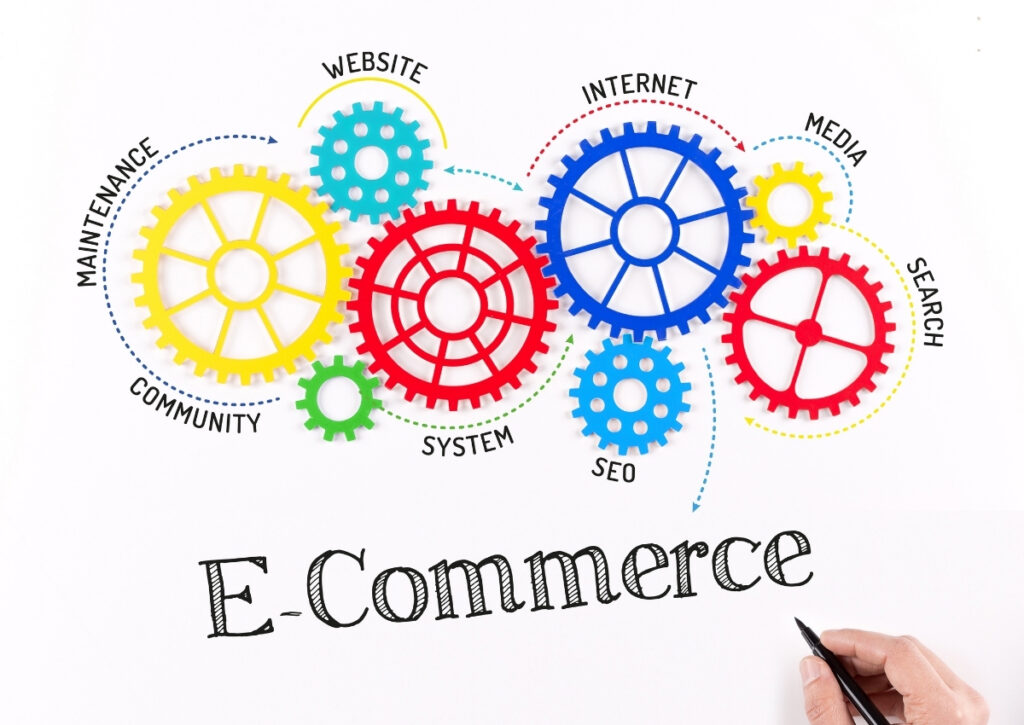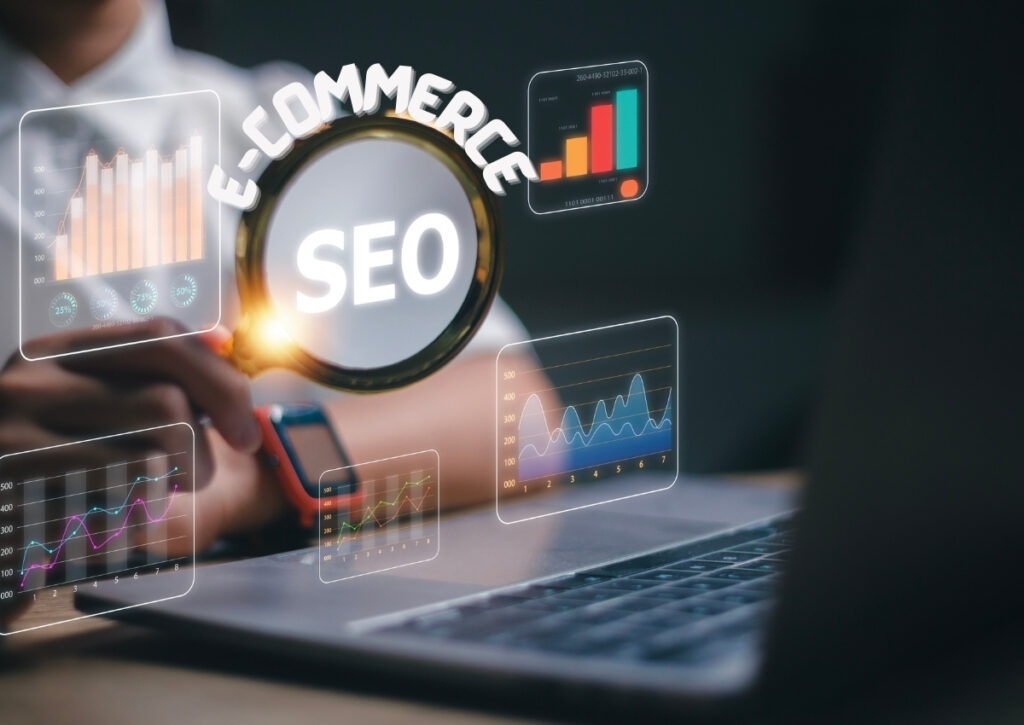E-commerce SEO, or E-commerce Search Engine Optimization, is a marketing technique to enhance the visibility and rankings of online stores on search engine result pages (SERPs) to attract more traffic. It involves optimizing various aspects of an e-commerce website, such as product pages, category pages, and content, to improve organic search rankings. E-commerce SEO focuses on strategies like keyword research, on-page optimization, technical SEO, content marketing, and link building to drive targeted traffic and increase sales. Unlike paid advertising, where businesses pay per click, E-commerce SEO lets websites capture relevant traffic at minimal cost by improving search engine rankings. Search engines like Google, Bing, and Yahoo rank e-commerce websites based on their SEO efforts, emphasizing the importance of optimizing content and technical aspects of the site for better visibility and user experience
Importance of E-commerce SEO for online businesses
E-commerce SEO is crucial for online businesses as it significantly drives traffic, increases visibility, and boosts sales. Here are key points from the provided sources that highlight the importance of ecommerce seo specialists for online businesses:

Driving Brand Awareness:
E-commerce SEO helps increase brand awareness by ensuring your website appears on the first page of search results, attracting potential customers, and improving click-through rates.
Filling the Marketing Funnel:
SEO is critical in driving traffic at different marketing funnel stages, from awareness to interest and action, influencing shopper movement towards conversion.
Elevating Content:
SEO targets transactional keywords and enhances other content like blog posts and guides, leading to increased traffic and improved user engagement at minimal cost.
Expanding Remarketing Audiences:
By driving organic search traffic to your site, you can build larger remarketing audiences for paid campaigns, increasing the chances of conversions.
Capturing the Long Tail:
E-commerce sites can effectively target long-tail keywords, which may drive fewer searches but collectively represent a significant portion of total searches, often leading to higher conversion rates.
Improving User Experience:
SEO helps optimize websites based on keyword data and user behavior, enhancing usability and potentially improving rankings by providing what users are searching for quickly and effectively.
Lowering Paid Search Costs:
Optimizing content for SEO benefits paid search campaigns by improving Quality Scores, reducing click costs, and enhancing performance in both organic and paid search channels.
Creating Lasting Value:
Unlike advertising campaigns that end once stopped, SEO is a long-term investment that continues to provide value over time through ongoing optimization efforts.
E-commerce SEO is essential for online businesses as it drives traffic, increases visibility, helps build brand authority, improves user experience, lowers costs, and creates lasting value for the company.
II. Understanding E-commerce SEO

E-commerce SEO involves specific strategies for online stores to enhance visibility and attract targeted traffic. Here are the critical components of an ecommerce seo specialist and the differences between traditional SEO and E-commerce SEO based on the provided sources:
Key Components of E-commerce SEO:
Mastering Keywords:
E-commerce SEO requires intensive keyword research tailored to product pages, category pages, and content pages to match potential customer searches effectively.
Prioritizing URLs:
In E-commerce SEO, it’s crucial to focus on important pages that customers search for while blocking irrelevant pages like shopping cart pages from search engine crawlers using robots.txt.
Site Structure:
Building a shallow site structure is essential in E-commerce SEO to ensure easy navigation for customers and to pass authority effectively within the site.
Responsiveness:
Websites must be responsive across all devices to cater to the increasing trend of mobile shopping, as search engines penalize non-responsive sites in rankings.
Page Load Speed:
Optimizing page load times is critical for E-commerce sites, as slow loading speeds can deter potential customers, leading to higher bounce rates and lower rankings.
Image Optimization: High-quality images are vital for ecommerce seo specialist as they enhance user experience and can influence purchasing decisions significantly.
Differences between Traditional SEO and E-commerce SEO:
- Keyword Intensity:
Compared to traditional websites, E-commerce SEO requires more intensive keyword research due to the specific nature of product, category, and content pages.
- URL Prioritization:
While both types of SEO focus on URLs, E-commerce SEO emphasizes blocking irrelevant pages like shopping carts from search engines to prioritize essential pages.
- Site Structure Complexity:
E-commerce sites often have thousands of products, and optimizing site structure is more challenging than optimizing traditional sites with more superficial structures.
- Mobile Responsiveness:
The emphasis on mobile responsiveness is higher in E-commerce SEO due to the significant portion of online smartphone purchases.
- Page Load Importance:
Page load speed is crucial for all websites, but it holds particular significance in E-commerce SEO, where customers may browse numerous products before making a purchase decision.
E-commerce SEO focuses on strategies like keyword intensity, URL prioritization, site structure simplicity, mobile responsiveness, and page load speed optimization tailored for online stores, distinguishing it from traditional SEO practices.
III. Strategies for E-commerce SEO Specialists

E-commerce SEO specialists employ various strategies to enhance the visibility and rankings of online stores. Here are the key strategies based on the provided sources:
A. Keyword Research and Optimization
- Identifying Relevant Keywords:
E-commerce SEO specialists focus on finding keywords that potential customers use to search for products online, tailoring them to match product characteristics, brand names, and other specifics.
- Implementing Keyword Optimization Techniques:
They optimize product and category pages with relevant keywords to improve rankings and attract traffic to the website, ensuring alignment with search intent and considering metrics like search volume and keyword difficulty.
B. On-Page Optimization
- Optimizing Product Pages:
Specialists optimize product pages by creating SEO-friendly URLs, meta tags, and descriptions that align with search intent and improve visibility on search engines.
- Creating SEO-Friendly URLs:
They prioritize important pages for search engines by blocking irrelevant pages like shopping cart pages using robots.txt to ensure web crawlers focus on essential pages.
C. Technical SEO for E-commerce

- Improving Site Speed and Mobile-Friendliness:
E-commerce SEO specialists focus on enhancing site speed and ensuring mobile responsiveness to cater to the increasing trend of mobile shopping and avoid penalties from search engine algorithms.
- Implementing Structured Data Markup:
They implement structured data markup for products to provide search engines with detailed product information, enhancing visibility and potentially leading to rich snippets in search results.
D. Content Marketing for E-commerce
- Creating Engaging Product Descriptions and Blog Content:
Specialists focus on creating high-quality product descriptions and engaging blog content to attract organic traffic, improve user engagement, and potentially increase conversions.
- Leveraging Content for Organic Traffic:
They leverage content marketing to drive organic traffic and conversions, ensuring that the content aligns with search intent and provides valuable information to users.
By implementing these strategies effectively, ecommerce seo specialist specialists can optimize online stores for better visibility, increased traffic, and improved conversions, ultimately driving the success of e-commerce businesses.
IV. Advanced Techniques and Tools
E-commerce SEO specialists employ advanced techniques and tools to enhance the visibility and performance of online stores. Here are key strategies based on the provided sources:
A. Link Building Strategies for E-commerce sites
- Building High-Quality Backlinks:
E-commerce SEO experts focus on acquiring high-quality backlinks from authoritative websites to improve site authority, boost rankings, and drive organic traffic.
- Utilizing Influencer Partnerships:
They leverage influencer partnerships to acquire valuable backlinks, increase brand visibility, and enhance the credibility of the online store, ultimately improving search engine rankings.
B. Performance Tracking and Analytics

- Monitoring Key Metrics:
E-commerce SEO specialists track essential metrics like traffic, conversions, and rankings to evaluate their strategies’ effectiveness and make data-driven optimization decisions.
- Using Tools like Google Analytics and Search Console:
They utilize tools like Google Analytics and Search Console to gather insights into website performance, user behavior, keyword rankings, and other crucial data points to continuously improve SEO efforts.
By implementing these advanced techniques and utilizing relevant tools effectively, ecommerce SEO specialist can optimize online stores for better visibility, increased traffic, and improved conversions, ensuring the success of e-commerce businesses in a competitive online landscape
Successful E-commerce SEO Campaigns:
- Etsy: Overview
- Overstock: Overview
Etsy:
Overview:
Etsy is a global online marketplace known for unique handcrafted products from independent artists and designers.
Strategies:
- Utilized strong E-commerce SEO strategies focusing on intuitive navigation, season-specific banners, and popular gift displays to enhance brand visibility and user experience.
- Leveraged “keywords by intent” through blog mentions and informational content to drive organic traffic and conversions.
- Emphasized Core Web Vitals for a mobile-first index ranking world, ensuring fast user experiences and supporting brand visibility for shops on the platform
Overstock:
Overview:
Overstock is an online retailer specializing in selling home goods at competitive prices.
Strategies:
- Demonstrated great Core Web Vitals, emphasizing user experience and site performance to attract and retain potential leads.
- Leveraged backlinks from fashion blogs and influencers to boost ecommerce seo specialist, showcasing how effective link-building can drive traffic and conversions for online stores
Analysis of Strategies Leading to Success:
Keyword Research and Optimization:
Identifying relevant keywords and implementing optimization techniques tailored to user search intent can significantly improve visibility and attract targeted traffic
On-Page Optimization:
Optimizing product pages, URLs, and meta tags for search engines enhances rankings and improves user experience, contributing to increased sales and conversions
Technical SEO:
Improving site speed and mobile-friendliness and implementing structured data markup for products are crucial for enhancing visibility and attracting organic traffic
Content Marketing:
Creating engaging product descriptions and blog content and leveraging content for organic traffic can drive user engagement, improve brand visibility, and increase conversions.
By implementing a comprehensive E-commerce SEO strategy that includes keyword optimization, on-page SEO, technical SEO enhancements, and content marketing, online stores can achieve improved visibility and increased organic traffic and drive sales and conversions successfully.
VI. Future Trends in E-commerce SEO

The future of E-commerce SEO is dynamic and ever-evolving, influenced by advancements in technology and changes in consumer behavior. Based on the provided sources, here are predictions for the evolving landscape of ecommerce seo specialist and recommendations for staying ahead in the industry:
Predictions for the Evolving Landscape of E-commerce SEO:
Advancements in AI and Natural Language Processing:
Continued advancements in AI and natural language processing will shape the future of E-commerce SEO, emphasizing the importance of creating content based on E-A-T signals (expertise, authoritativeness, and trustworthiness)
Search Intent as a Critical Influence:
Search Intent will remain a critical influence in keyword research and content creation, highlighting the need to understand user intent to drive organic traffic effectively
Page Speed and Technical SEO Importance:
Page speed optimization and technical SEO will continue to be crucial factors for E-commerce websites, ensuring fast-loading pages, seamless user experiences, and improved search engine rankings
Localization in SEO:
The increasing globalization of businesses will lead to a growing emphasis on localization in SEO, with geo-referenced results becoming more prevalent to cater to specific regions and cities
Zero-Click Searches:
Zero-click searches, where users find answers directly on search results pages through featured snippets or knowledge panels, will rise in popularity, impacting web page visibility and traffic
Mobile-First Approach:
The mobile-first approach will continue to be a trending topic in SEO, emphasizing mobile optimization and indexing to enhance user experience and search engine rankings
Recommendations for Staying Ahead in the Industry:
Focus on Content Quality:
Create authentic, valuable content that aligns with user intent to cater to evolving search algorithms and user preferences
Optimize for Search Intent:
Prioritize understanding user intent to drive organic traffic effectively by aligning content with what users are searching for
Technical Optimization:
Invest in technical SEO improvements like page speed optimization, Core Web Vitals enhancements, and structured data markup to ensure a seamless user experience and better search engine visibility
Stay Updated with Trends:
Continuously monitor industry trends, algorithm changes, and emerging SEO techniques to adapt strategies effectively and stay competitive in the evolving landscape of E-commerce SEO
By embracing these predictions and recommendations, businesses can successfully navigate the future trends of E-commerce SEO, ensuring optimized visibility, increased organic traffic, and improved conversions in the competitive online market.
VII. Conclusion
In the blog post on E-commerce SEO strategies, several key points were highlighted to enhance the visibility and success of online stores. E-commerce SEO specialists are encouraged to implement these strategies effectively to stay ahead. By focusing on user intent, optimizing product pages, building quality backlinks, and staying updated with evolving trends, specialists can enhance E-commerce websites’ visibility, user experience, and overall success. Continuous learning, adaptation to new technologies, and a customer-centric approach will be key to thriving in the competitive landscape of E-commerce SEO.
